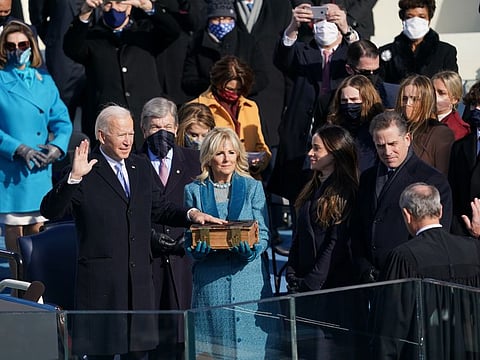President Joe Biden: For America, a new way forward
Biden can heal American wounds and restore its role as leader of the free world

True, inaugurations in Washington, when a president-elect takes the oath of office on the west front of the US Capitol with 200,000 guests in attendance, are meant to be solemn affairs, given the fact that with each transfer of power from one administration to the next a new chapter in political life begins.
But in reality they are not. Inaugurations are festive, celebratory events that draw over a million people to the National Mall, who watch the ceremony from giant television screens, erupting in triumphal cheers.
Not this year. Not by a stretch.
For Biden’s inaugural event, the nation’s capital was an armed fortress, a ghost town under military occupation, as it were, its downtown district fenced off and surrounded by 25,000 National Guard troops.
Also Read: A distressed America seeks to heal in 2021
Also Read: US Elections 2020: Why I voted for Joe Biden
Reminiscent of the Green Zone in central Baghdad during the Iraq war, you say? Guess what, the Secret Service had in fact incorporated the term into inauguration maps. A truly unprecedented state of affairs in American history.
I look out the window from my apartment on the 7th floor in my high-rise building where I live in Cleveland Park, close to the Mall — closed to the public — and see the Washington Monument there, the tallest obelisk in the world, jutting forlornly into the sky.
And you feel a crazy sense of weariness inside. You wonder if the nation will ever heal those wounds gnawing away at the heart of its polarised society, as the new president goes about confronting the challenge of dealing with not one but two Americas — let’s face it, close to 80 million voters cast their ballots for the incumbent — each claiming God, history or moral rectitude on its side.
This is a divided nation, as the bard put it in Much Ado About Nothing, “With one foot in the sea, one on shore/ To one thing constant never”. Yet, in American history, the sea and the shore have miraculously, at the end of the day, always intertwined seamlessly
America has exchanged Donald J. Trump, a volatile chief executive with a penchant for freewheeling rhetoric, for Joseph Robinette Biden, an everyday, regular Joe from Delaware.
The man has already claimed that, as the 46th president of the United States, he will aim to calm racial strife, to make health care available to more Americans, to push the US to rejoin the Paris Agreement on climate change, end the Muslim ban and restore Americans’ faith in democracy.
But the most immediate, the most existentially pressing issue for him, he has repeatedly said, would to tame the coronavirus pandemic, which has already claimed 400,000 American lives. (How dire is the impact of that virus in America? Imagine, it took 12 weeks for the death toll to rise from 200,000 to 300,00, and then leap to 400,000 in less than five weeks!)
The president told a drive-in rally in Wilmington, Delaware, in an off-the-cuff speech that came 48 years to the day after he was elected by the state to the US Senate in 1972: “We cannot repair the economy, restore our vitality or relish life’s precious moments — birthdays, graduations, hugging a grandchild, all the moments that matter to us — until we get this virus under control”.
Look, Joe Biden’s rhetoric, simple and to the point but with a hint of feistiness thrown in, projects the idiom of ordinary Americans.
Americans everywhere are alarmed at the direction their polarised nation has taken in recent years — indeed, so alarmed that 150 million went to the polls in 2020, the largest turnout in American history.
These anxious Americans, and along with them the rest of the world, will be watching to see if the new administration will find a new way forward for America to heal its wounds and restore its role as leader of the free world.
For the new president, this is a turning point and it is not yet clear whether he will turn with it. For Trump, along with the legacy he left behind as a four-year occupant of the White House, well, he will face the judgement of history. We all have got to move on.
— Fawaz Turki is a journalist, academic and author based in Washington. He is the author of The Disinherited: Journal of a Palestinian Exile





